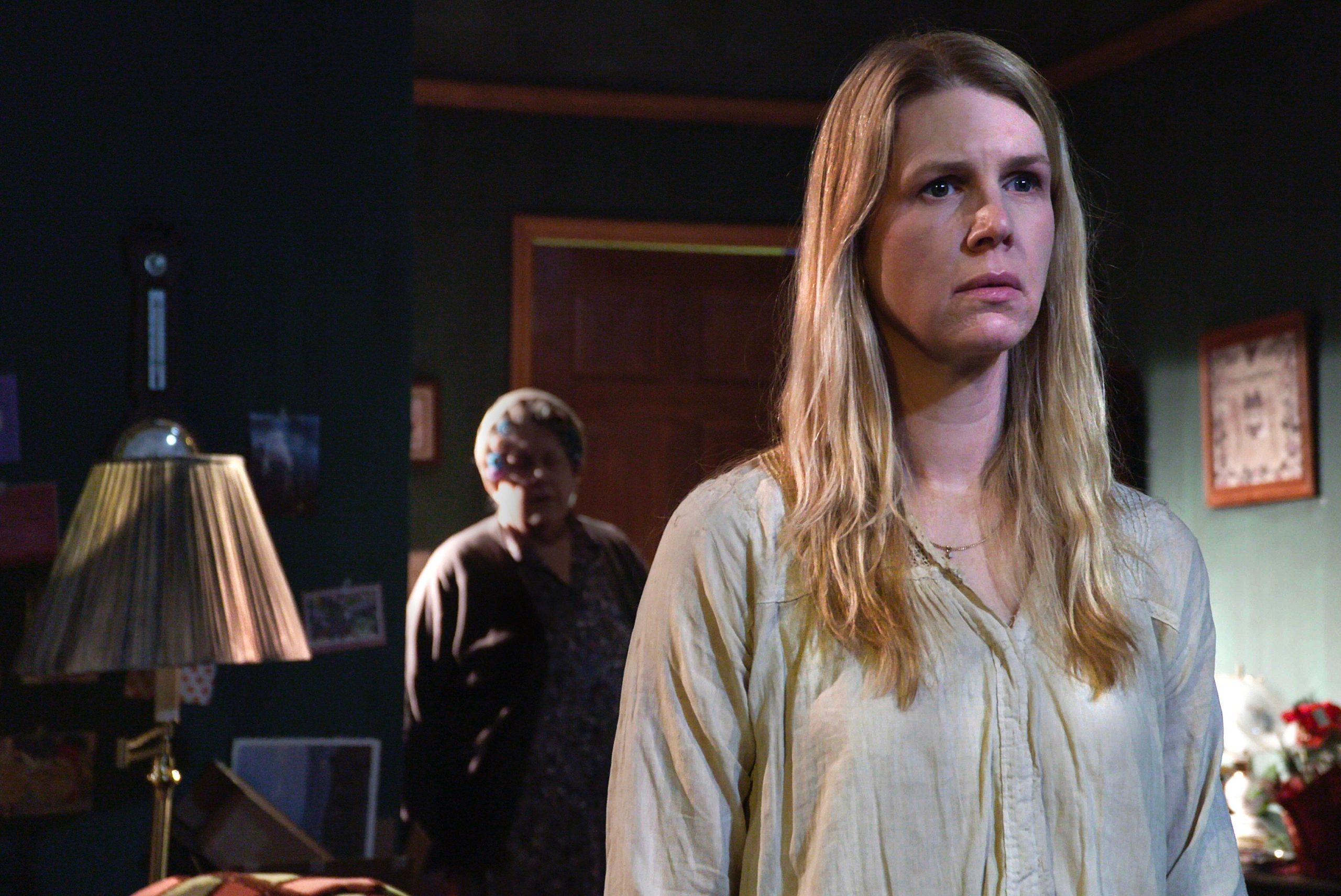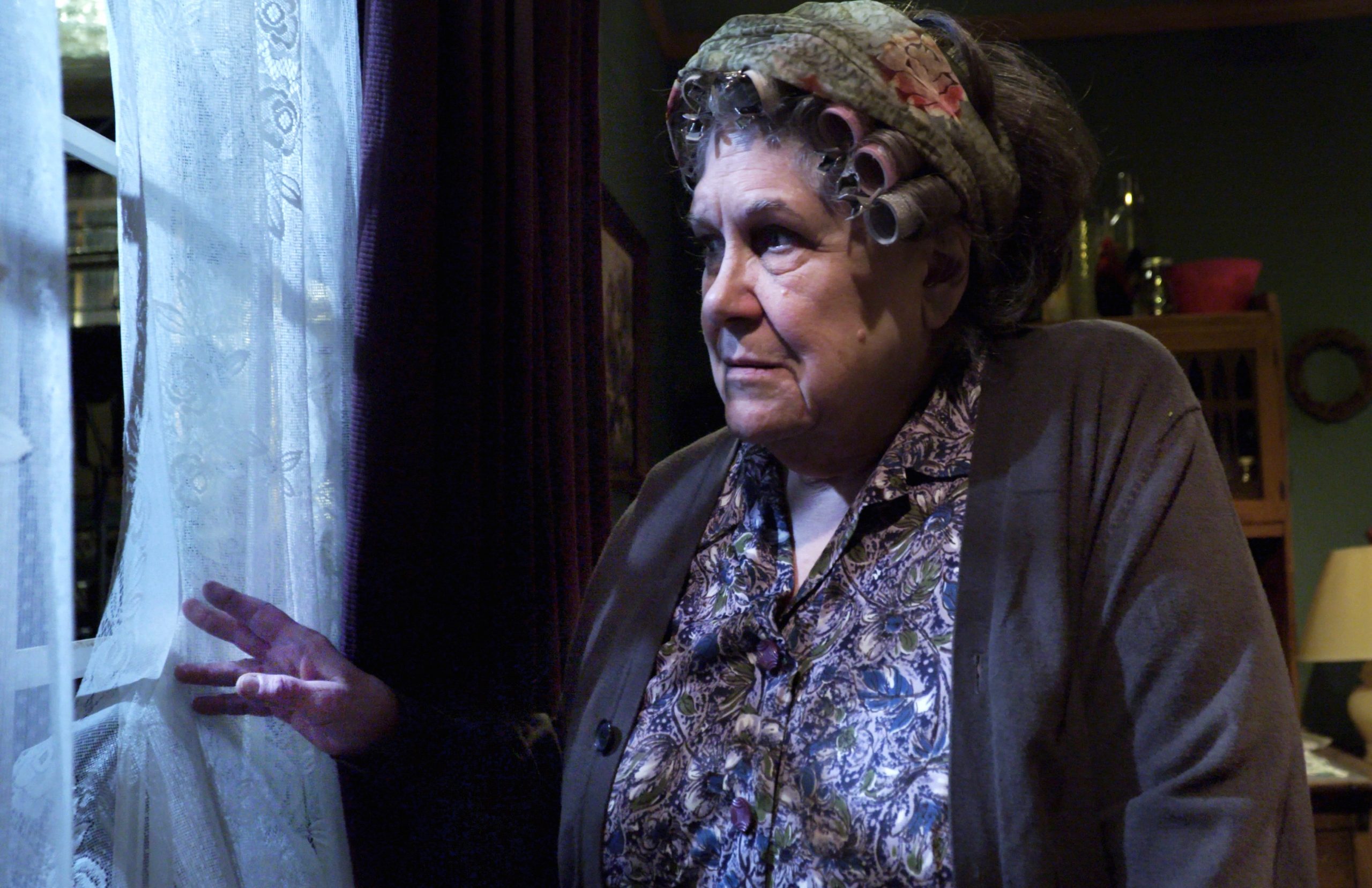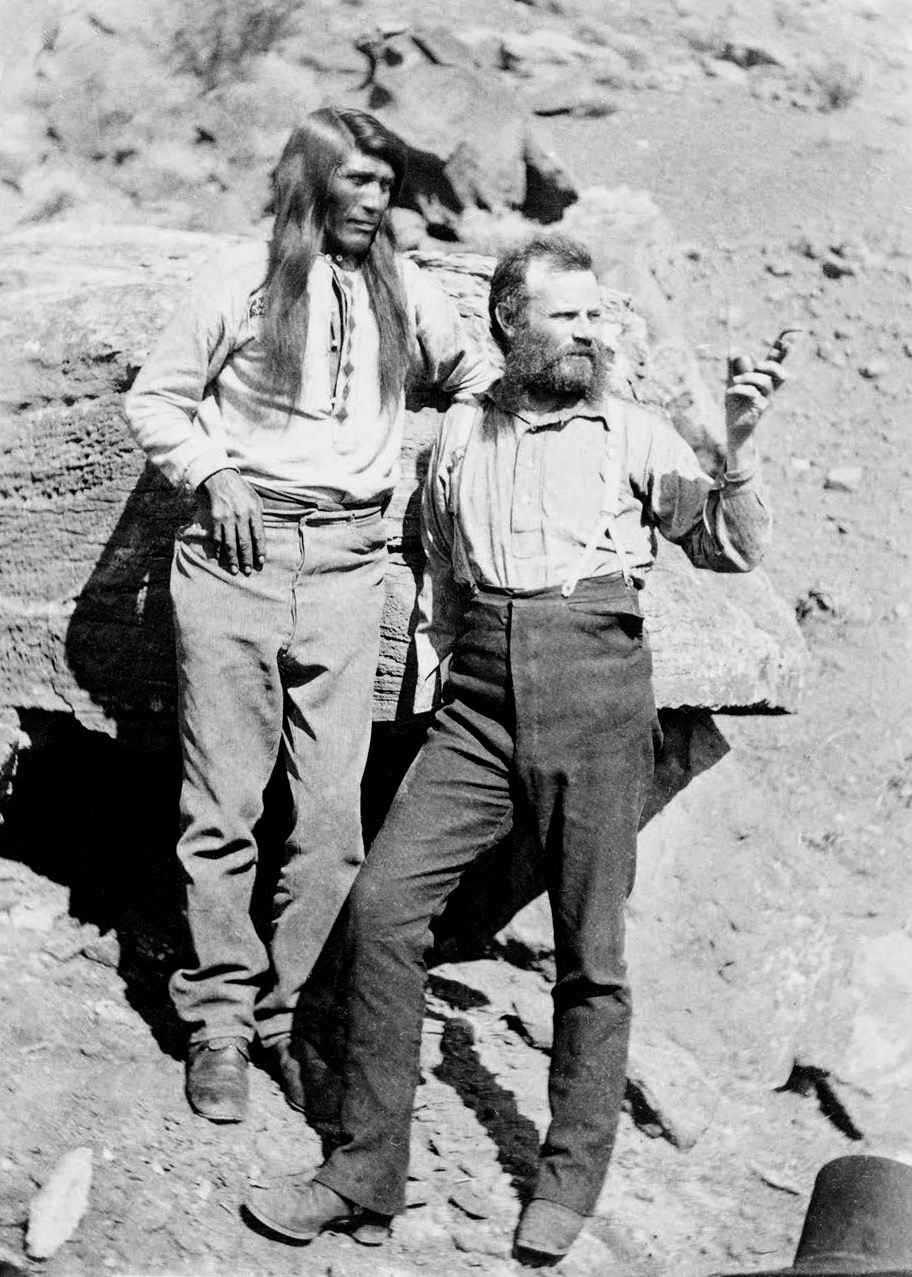March Theater Guide: Thoroughly Modern Masters
- Like
- Digg
- Del
- Tumblr
- VKontakte
- Buffer
- Love This
- Odnoklassniki
- Meneame
- Blogger
- Amazon
- Yahoo Mail
- Gmail
- AOL
- Newsvine
- HackerNews
- Evernote
- MySpace
- Mail.ru
- Viadeo
- Line
- Comments
- Yummly
- SMS
- Viber
- Telegram
- Subscribe
- Skype
- Facebook Messenger
- Kakao
- LiveJournal
- Yammer
- Edgar
- Fintel
- Mix
- Instapaper
- Copy Link

It’s a March of literally living theater from Pittsburgh companies, with Quantum’s ‘Far Away’ at the front end of the schedule. The actors are Lisa Velten Smith in the foreground and Ingrid Sonnichsen lurking. (photo: Joe Seamans)
Pittsburgh theater is all digital again this month, and it’s all contemporary: Every play is by a living playwright. One might think that in a sense, this makes it like television, since all TV fare except for reruns is created somewhere between real time and a couple of years ago. But in fact the art forms differ. Television has its own strengths, like the ability to unfold a story across multiple episodes. (Recent example: “The Queen’s Gambit.” The original story, a novel by Walter Tevis, could have been adapted as a stage play … but it comes across more fully as a 7-part miniseries.)
And live theater? Even when it’s not-so-live, as in our current streaming mode, theater artists give us stories, themes, and treatments of those themes that you just won’t find very often in TV land. As the March lineup demonstrates, contemporary theater manages to be new and unusual even when dealing with old material.
Would any TV studio do a modern remake of the late-medieval morality play Everyman? Playwright Branden Jacobs-Jenkins did, and his quirky Everybody was a Pulitzer Prize finalist. Men on Boats, by Jaclyn Backhaus, is a history play that stays true to the facts while presenting them in a way that flips the epic hilariously inside-out. Naomi Iizuka’s Polaroid Stories recasts characters from Greek mythology as street people in a modern city—and it may have inspired Tom Arvetis’ Spark, which does the same sort of thing, but differently.
All of the above are from Pittsburgh’s university theaters. So is Dead Man’s Cell Phone, by Sarah Ruhl, a play that Oscar Wilde might have written if he’d had an iPhone, except it goes wilder than Wilde. Meanwhile our professional companies present Caryl Churchill’s Far Away and Jill Sobule’s F*ck7thGrade, each unique in its own fashion, along with Tammy Ryan’s North of Forbes, a Pittsburgh-ized adaptation of an Agatha Christie mystery. And speaking of Pittsburgh mysteries, you may wish to catch the latest streamer/screamer in 12 Peers’ Yinzer Scared Online series, Dooker’s Hollow by Wali Jamal.
Shows are previewed in order of their run dates. Rick Handler (R.H.) contributed to this Guide.
FAR AWAY by Caryl Churchill. Quantum Theatre, streams through March 7

Aunt Harper, played by Ingrid Sonnichsen, sees much and tries to keep it under her curlers. (photo: Joe Seamans)
Caryl Churchill has been showing up on lists of the greatest living playwrights for so long that it’s hard to believe she is still alive. (Which she is, last time we checked, at the age of 82.) Churchill’s plays are strange but engaging. They hover between fantasy and realism; they may time-hop or throw conventional story structure out the window. Done with human insight, these tricks resonate—perhaps because we tend to live in between our fantasies and reality, in a world that doesn’t follow tidy story lines. One catch: Churchill plays aren’t made into major motion pictures. This usually means you have to wait and hope for a local company to stage one of them. But now Quantum Theatre brings peak Churchill to your home viewing screen, with a filmed-and-streamed production of Far Away. It’s a dark-comic dystopian drama about social disintegration and hatmaking.
At the core of Far Away is a romance between a young woman and man who work in a factory producing artistic, custom-designed hats, which unfortunately are worn for not-so-happy occasions. The play runs a tight, tense 45 minutes. Quantum Theatre presents Far Away with actors Lisa Velten Smith, Andrew William Smith, and Ingrid Sonnichsen. A donation of $10 or more gives you online access any time through March 7. (M.V.)
F*CK7THGRADE (concert film version) by Jill Sobule, with text by Liza Birkenmeier. City Theatre, streams through June 30.

Jill Sobule’s concert band, Secrets of the Vatican, don horse head masks for the song ‘I Hate Horses,’ a stirring number from ‘F*ck7thGrade.’ (photo: Kristi Jan Hoover for City Theatre)
Singer/songwriter Jill Sobule’s rough 7th grade year turned her into the successful person and recording artist that she is today. Her F*ck7thGrade musical was originally slated to be the last play of City Theatre’s 2019-2020 season, but unfortunately was cancelled due to covid, with City deciding to turn it into a concert film. It was shot in August of last year at Hazelwood Green in advance of City’s Drive-in Arts Festival. Sobule tells funny, and sometimes painful stories about her 7th grade life. One humorous story is about Sobule riding around Denver, Colorado on her Raleigh blue chopper bicycle. Other personal themes include coming of age sexually, and achieving success in the music industry. The concert film is a very pleasing mix of Sobule’s hit songs, including the iconic “I Kissed a Girl,” performed with her full band, and stories from her life. See our story on the production and an interview with Sobule. (R.H.)
POLAROID STORIES by Naomi Iizuka. Pittsburgh Playhouse (Point Park Conservatory), streams on demand March 10-14.
Polaroid Stories is not about Edwin Land, inventor of the instant camera. It’s a play in which Dionysus, the Greek god of wine and mad excess, is reincarnated as a modern drug dealer in the slums. Despite his seedy trade, he’s also a sort of father figure to the desperate young people who frequent his realm. They include Orpheus and Eurydice, young lovers with a crazy relationship; Narcissus, trapped in self-absorbed perplexity, and a skinhead couple, none of whom are helped much by the insufferably pompous Zeus. Polaroid Stories is a 1997 play from L.A.-based playwright Naomi Iizuka, who often but not always uses classical themes for contemporary stories. Iizuka’s Good Kids, inspired by news reports about the social-media frenzy that followed a rape case at a high school, was staged in Pittsburgh a few years ago. But Polaroid Stories remains one of her most popular plays, and Point Park Conservatory Theatre streams an online production with pay-what-you-can tix at $5 to $15 for a two-day viewing rental. (M.V.)
DEAD MAN’S CELL PHONE by Sarah Ruhl. Pittsburgh Playhouse (Point Park Conservatory), streams on demand March 10-14.
You’re trying to enjoy lunch in a cafe. A man at a nearby table has a constantly ringing cell phone that he will not answer. Irked, you stride over to him, and learn why he isn’t picking up: He is dead. Do you take the incoming call? In the Sarah Ruhl play Dead Man’s Cell Phone, the person facing this quandary is an earnest young woman. Out of duty to the deceased, she takes the call and even keeps the phone, figuring she might help to straighten out the poor man’s affairs. Little does she suspect how crooked and convoluted they are. If you’ve caught other plays by Ruhl—like Orlando and In the Next Room, or The Vibrator Play—you will know to expect a serious theme wrapped in layers of surreal hilarity. Point Park Conservatory Theatre streams Dead Man’s Cell Phone in a version you can watch on your phone. Or on someone else’s. (M.V.)
CARNEGIE MELLON NEW WORKS SERIES (4 new plays). Carnegie Mellon School of Drama, streams March 11-13, various times.
It is a tradition at Carnegie Mellon’s drama school to present student-directed and/or student-written productions free to the public. This year the offerings are online, with a New Works Series that premieres four plays by graduate students in the Dramatic Writing program. The Beach, by Kate Vargish, involves two persons on a beach where the ocean becomes unnaturally hostile. Tracy Hoida’s E-Z Fix explores gender identity issues through the tale of a nonbinary inventor who builds sympathetic androids but is threatened by a time traveler with an out-of-kilter time machine. 21, by Paloma Sierra, is about Roberto Clemente. And Pass It On, by Alec Seymour, concerns a young man locked into the role of storyteller and entertainer for his dysfunctional family. The plays stream at various dates and times; see the New Works Series website for details and access. (M.V.)
SPARK by Tom Arvetis. Pitt Theatre Arts, streams March 12 – 21.
Starting in the late 1800s, when American cities teemed with immigrants, social reformers opened “settlement houses” in poor neighborhoods, offering resources that ranged from literacy and vocational classes to cultural activities and basic health care. Many of these places, like the Irene Kaufmann Settlement in Pittsburgh’s Hill District and Jane Addams’ famous Hull House in Chicago, are now gone. But one that lives on is Northwestern Settlement, founded in 1891 in Chicago’s West Town area. Current programs include an acclaimed theater company for youth, run by Artistic Director Tom Arvetis—and here in Pittsburgh, Pitt’s Department of Theatre Arts is presenting an online version of his play Spark. Arvetis wrote the play with input from Chicago middle school students and families. Inspired by the Greek myth of Prometheus and humans’ first use of fire—and also by video games—it’s a futuristic fantasy about a young girl living in a sequestered realm, who learns about empowerment and possibilities she hadn’t imagined. Spark is TYA (theater for young audiences) but grownups can enjoy it too. Pitt Theatre Arts streams the play on Vimeo March 12 through 21. (M.V.)
MEN ON BOATS by Jaclyn Backhaus. Carnegie Mellon School of Drama, streams March 13-15.

Alpha males: John Wesley Powell (R), some years after his 1869 expedition, with Taú-gu, Great Chief of the Southern Paiutes. (photo: John K. Hillers, early 1870s)
Who remembers the days of old, when men were men, hearty and bold? New York-based playwright Jaclyn Backhaus read about those days as a girl growing up in Arizona, and she gives them a historically accurate but comically revisionist treatment in Men on Boats. The play is drawn from John Wesley Powell’s journal of his geographic expedition of 1869, in which he and nine others traveled down the Colorado River through the Grand Canyon. All were rugged, skilled outdoorsmen. The trip was hair-raising, though, as their areas of expertise did not include steering wooden rowboats through ferocious, rock-infested rapids that the local Tribal people knew better than to mess with. Backhaus puts a twist in history by specifying that the expedition’s madly macho men be played by “actors who are female-identifying, trans-identifying, gender-fluid, and/or non-gender-conforming.” Although some modern rugged individualists have walked out of previous productions of Men on Boats, the toughest audience members stay with it and find the play a hoot. Carnegie Mellon’s School of Drama floats an online production March 13 through 15.
EVERYBODY by Branden Jacobs-Jenkins. Carnegie Mellon School of Drama, streams March 16-18 and March 20.
Remakes in live theater are different from remakes in the movies. Typically the original is over 100 years old, sometimes much older. Most modern remakes keep the plot outline and major characters but essentially create a new play, and many are very good. Recent highlights in Pittsburgh theater have included Stupid Fucking Bird (from Chekhov’s The Seagull) and An Octoroon (from the 1859 race melodrama). Now comes a modern version of a real oldie. Branden Jacobs-Jenkins, the New York-based playwright and Octoroon remaker, has one called Everybody. This is an update of Everyman, the morality play that was popular in the 1500s, when many people were not particularly interested in repenting but would watch it being done on stage. Like the original, Everybody is allegorical. Characters include God, Time, Friendship, Stuff, and Death. Unlike the original, Everybody was a finalist for the 2018 Pulitzer Prize. Carnegie Mellon School of Drama streams the play for free at select times March 16-18 and 20. (M.V.)
NORTH OF FORBES by Tammy Ryan. Pittsburgh Public Theater, streams March 18 – 21.
Great fictional detectives tend to stalk quietly onto the stage, making their presence known only with time. Sherlock Holmes’ first appearance in print was little noted; Philip Marlowe evolved gradually from earlier versions of himself; and Dashiell Hammett’s anonymous Continental Op never even acquired a name. One exception: Hercule Poirot. The cerebral Belgian became an instant star when author Agatha Christie scored a hit with her first detective novel, The Mysterious Affair at Styles. And now, 101 years later, playwright Tammy Ryan gives us a Pittsburgh-ized adaptation of Poirot and Styles. Ryan’s North of Forbes streams to your screen as part of Pittsburgh Public Theater’s online PlayTime series, Classics N’at. The North of Forbes district is considered an upscale area of Squirrel Hill, just as Styles Court was an upscale manor in 1920, so that fits. But many questions remain. Will “Poirot” be pronounced the French/Belgian way or the Yinzer way, a la North Versailles? Will the strychnine that poisons the victim be slipped into a craft brew, a local coffee, or a vegan pastry? Find out with a virtual ticket to North of Forbes for $10 or more. (M.V.)
SHARON (puppet video series) by Molly Rice and Rusty Thelin. RealTime Interventions, streams constantly with new episodes added.

Sharon, star of the puppet docudrama ‘Sharon,’ is a working-class heroine to parents and their kids in Pittsburgh.
Among online productions from Pittsburgh theater companies, Sharon is one of a kind. We have here a pre-filmed (well, video-recorded) series using Calico Critters dolls as tiny puppets on miniature sets. Produced by RealTime Interventions, Sharon comes across as artfully done, socially relevant, and just plain cute. Title character Sharon—a little brown bear dressed in human clothes—is a child care worker who enjoys her cigarettes and coffee when not tending the kids. Molly Rice and Rusty Thelin, co-artistic directors of RealTime, conceived the series from their own experiences with child care and fleshed it out by interviewing local caregivers. Aided by artists in several specialties, they blend real-life scenery footage with the puppetry to create episodes that are more convincing than you might imagine. “Chapter 1” is online free; the second is viewable for a donation of $5 or more. Get into Sharon’s world by visiting RealTime on the web. (M.V.)
MYTHBURGH Series. 12 Peers. Episodes by various writers. Ongoing streaming.

Brittany Tague, of the Yinzer Scared team at 12 Peers, shows she can hold her beer while preparing for a role in Wali Jamal’s ‘Dooker’s Hollow.’ (photo: 12 Peers Theater)
12 Peers Theater is a small Pittsburgh company known for producing great plays, and also for its Mythburgh storytelling events, which until last spring were held live. Covid-19 put that on hold but the Mythburgh concept has returned online, in somewhat altered form. It’s now a monthly series titled Yinzer Scared Online. Each episode consists of a spooky Pittsburgh-based story populated by an imaginary but recurring cast of characters: Think “Night Vale,” except it has video and is expressly for yinz! Click the preceding Yinzer Scared link to watch—and to catch up on episodes you may have missed. Episodes include “Mystic Matt and the Bridge to Nowhere,” “Fake Boos,” “Ghoulfriends,” and “Dooker’s Hollow.” (M.V.)
Mike Vargo, a Pittsburgh-based freelance writer, covers theater for Entertainment Central. Rick Handler is executive producer of Entertainment Central.
Share on Social Media
- Like
- Digg
- Del
- Tumblr
- VKontakte
- Buffer
- Love This
- Odnoklassniki
- Meneame
- Blogger
- Amazon
- Yahoo Mail
- Gmail
- AOL
- Newsvine
- HackerNews
- Evernote
- MySpace
- Mail.ru
- Viadeo
- Line
- Comments
- Yummly
- SMS
- Viber
- Telegram
- Subscribe
- Skype
- Facebook Messenger
- Kakao
- LiveJournal
- Yammer
- Edgar
- Fintel
- Mix
- Instapaper
- Copy Link
Follow Entertainment Central
Sign up for the EC Newsletter
Latest Stories







